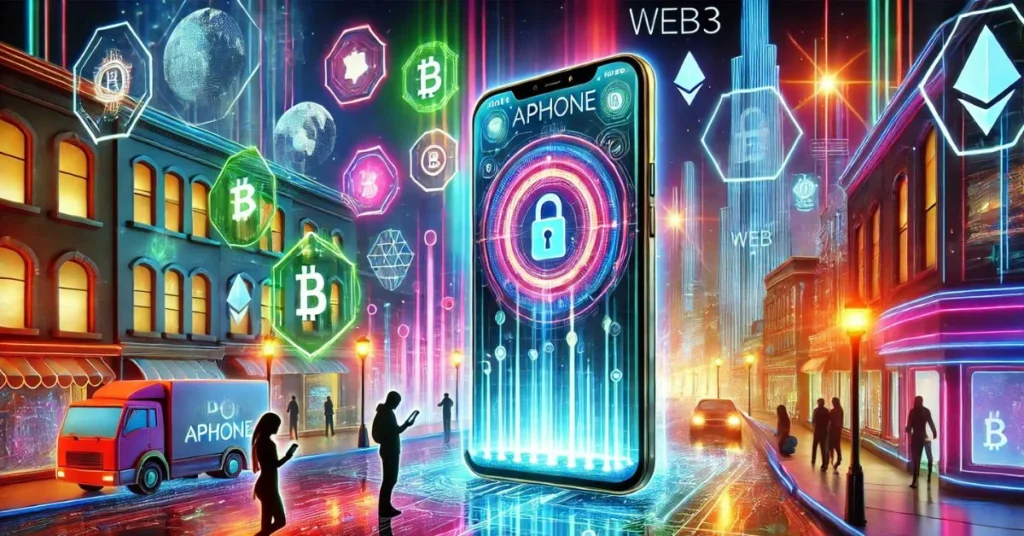In today’s digital era, mobile technology is undergoing a revolutionary transformation. Traditional smartphones are making way for innovative devices that not only call and text but also integrate with groundbreaking blockchain technology. Enter APhone, a device that is redefining mobile freedom by harnessing the power of Web3. In this article, we explore how APhone is setting a new standard for connectivity, security, and user empowerment while ushering in an era where mobile technology meets decentralized networks.
Introduction to APhone and Web3
The mobile landscape is no longer just about flashy displays and high-speed internet. It’s about connecting people in a more secure, decentralized, and user-centric manner. The fusion of mobile technology with blockchain capabilities has opened the door for devices like APhone, which seamlessly integrate with Web3 protocols.
Understanding APhone
APhone is not just another smartphone—it’s a reimagined communication device built with the future in mind. It combines the best aspects of traditional mobile functionality with the decentralized power of blockchain. Unlike conventional devices, APhone emphasizes privacy, security, and complete ownership of your data. Imagine a smartphone that not only lets you communicate but also gives you full control over your personal information—this is what APhone promises.
The Emergence of Web3
Web3 represents the next evolution of the internet, shifting from centralized platforms to a decentralized ecosystem powered by blockchain. It’s a digital revolution where users reclaim control over their data and digital identities. In a world where privacy concerns are at an all-time high, Web3 offers a refreshing alternative by ensuring transparency, security, and empowerment for every user. With Web3, trust is built into the system rather than imposed by external authorities.
The Evolution of Mobile Technology
The journey from traditional mobile phones to APhone is a testament to how far technology has come. While older smartphones focused on hardware upgrades and software tweaks, modern devices like APhone are pioneering a complete transformation.
From Traditional Smartphones to APhone
Traditional smartphones have long been a staple in our daily lives, but they come with inherent limitations. They rely heavily on centralized platforms, which means your data is stored on servers controlled by tech giants. With APhone, the paradigm shifts: you own your data, and your digital identity is under your control. This evolution is akin to moving from a rental property to owning your own home—where you decide what goes in and what comes out.
Web3’s Impact on Mobile Innovations
Web3’s influence is not confined to the world of cryptocurrencies and decentralized finance; it’s permeating every aspect of digital interaction, including mobile technology. With blockchain integration, mobile devices can now offer unprecedented security measures, transparent data transactions, and enhanced privacy controls. This shift means users can engage in secure communications and transactions without relying on third-party intermediaries, making every interaction more direct and trustworthy.
Key Features of APhone
APhone stands out in the crowded mobile market by offering features that cater to the modern user’s need for freedom, privacy, and efficiency. Let’s delve into some of its standout attributes.
Decentralized Ecosystem
At the heart of APhone lies its decentralized ecosystem. Unlike conventional smartphones that operate on centralized networks, APhone leverages blockchain technology to create a peer-to-peer environment. This decentralized approach ensures that no single entity can monopolize user data, promoting fairness and transparency across the board. Think of it as a digital neighborhood where everyone has an equal say.
Enhanced Security and Privacy
Security is paramount in our digital lives, and APhone doesn’t take it lightly. With built-in blockchain protocols, every transaction, message, and piece of data is encrypted and stored securely. This enhanced security not only protects against cyber threats but also guarantees that your personal information remains private. It’s like having a personal bodyguard for your digital life—always on duty, always vigilant.
User Empowerment and Data Sovereignty
One of the most significant advantages of APhone is the empowerment it offers to its users. Traditional smartphones often treat user data as a commodity to be exploited, but APhone flips the script. Here, you control your data, decide how it’s shared, and can even monetize it if you wish. This level of empowerment is revolutionary, turning passive consumers into active participants in the digital economy.
How Web3 Transforms Mobile Freedom
The integration of Web3 into mobile devices like APhone is reshaping our understanding of connectivity. It’s about more than just faster internet speeds—it’s about complete freedom and autonomy.
Blockchain Integration in Mobile
Blockchain technology is the backbone of Web3, and its integration into mobile devices marks a seismic shift. With blockchain, every transaction is transparent, immutable, and secure. This means that whether you’re sending a message or transferring funds, there’s a verifiable record that guarantees integrity. For mobile users, this represents a major leap forward in terms of both trust and functionality.
Ownership and Data Control
In the era of Web3, data is no longer an asset controlled by corporations—it’s yours to own. APhone exemplifies this shift by allowing users to take charge of their digital footprints. From controlling access to personal information to making informed decisions about data sharing, APhone offers a level of transparency and control that was previously unimaginable. This shift to data sovereignty is transforming the digital landscape, much like switching from a guided tour to an open-world adventure where you chart your own course.
The Future of Mobile Communication
As we look to the future, the potential of mobile technology becomes even more exciting. APhone is not just a glimpse of what’s possible—it’s a blueprint for the future of mobile communication.
The Role of NFTs and Digital Identity
Non-fungible tokens (NFTs) are making waves in various industries, and mobile technology is no exception. On APhone, NFTs can be used to establish digital identities that are secure, verifiable, and entirely unique. This innovation is set to transform how we perceive ownership in the digital realm, offering users a way to authenticate their identity and digital assets in a decentralized manner. Imagine your digital persona being as unique and valuable as a rare piece of art—this is the promise of NFTs integrated with mobile technology.
Smart Contracts and Seamless Transactions
Smart contracts are self-executing contracts with the terms of the agreement directly written into code. They enable seamless, trustless transactions without the need for intermediaries. On APhone, smart contracts facilitate everything from microtransactions to complex financial deals, ensuring that every interaction is secure, efficient, and transparent. This capability is akin to having an automatic, unbreakable handshake every time you engage in a transaction—no questions asked, no delays, and no interference.
Challenges and Opportunities
No technological revolution comes without its set of challenges. While APhone and Web3 herald a new era of mobile freedom, there are hurdles to overcome along the way.
Technical and Adoption Barriers
Transitioning from traditional mobile networks to a decentralized ecosystem is not without its challenges. For one, the technology behind blockchain integration in mobile devices is still evolving. This means that users might face occasional hiccups in performance or compatibility issues with legacy systems. Moreover, widespread adoption requires a significant shift in user mindset—a move from convenience to empowerment, which doesn’t happen overnight. Overcoming these barriers will require continuous innovation, robust infrastructure, and a willingness from users to embrace change.
Innovations on the Horizon
Despite the challenges, the future is bright for APhone and similar technologies. Innovations in blockchain scalability, enhanced security protocols, and more user-friendly interfaces are on the horizon. As developers continue to refine and optimize these systems, we can expect smoother experiences, broader adoption, and a more integrated ecosystem where mobile freedom is not just a promise but a reality. The journey might have its bumps, but every technological revolution comes with its share of growing pains before it reaches its full potential.
APhone in the Real World
Theory is one thing, but real-world applications are where technology truly proves its worth. APhone is already making waves in various sectors, demonstrating how decentralized mobile technology can change everyday lives.
Case Studies and User Experiences
Across the globe, early adopters of APhone have reported transformative experiences. For instance, users in regions with strict digital surveillance have embraced APhone for its enhanced privacy and security features. In bustling metropolitan areas, tech enthusiasts appreciate the freedom of data ownership and seamless transactions, which allow for a more dynamic interaction with digital services. These firsthand accounts highlight how APhone is not just a concept but a tangible solution addressing modern digital challenges.
Market Reception and Trends
The market reception to APhone has been overwhelmingly positive, driven by a growing demand for devices that offer both functionality and freedom. As more consumers become aware of the benefits of a decentralized ecosystem, interest in APhone continues to surge. Industry experts are predicting that this trend will only intensify as the broader adoption of Web3 technologies accelerates. This surge in interest is not just a fad—it’s a reflection of a fundamental shift in how people view technology, privacy, and data ownership.
Conclusion and Future Outlook
As we wrap up our exploration of APhone and its role in redefining mobile freedom with Web3, it’s clear that we are witnessing the dawn of a new era in mobile technology.
Final Thoughts
APhone is more than just a smartphone—it’s a revolution in the way we interact with technology. By integrating blockchain technology and leveraging the decentralized power of Web3, APhone empowers users like never before. It challenges the traditional norms of data ownership and security, paving the way for a future where every user can enjoy true digital freedom. Whether it’s through enhanced privacy measures, seamless smart contracts, or the innovative use of NFTs, APhone is setting a new benchmark for what a mobile device can be.
Looking Ahead: The Next Steps
The road ahead is filled with promise and potential. As developers continue to innovate and overcome technical challenges, we can expect even more advanced iterations of APhone and similar devices. The fusion of mobile technology and Web3 is poised to transform industries, empower individuals, and redefine how we experience digital interactions. It’s an exciting time to be a part of this revolution—a time when every mobile interaction is not just a transaction, but a step towards a more empowered and liberated digital future.
FAQs
What exactly is APhone?
APhone is an innovative mobile device that integrates traditional smartphone functionalities with decentralized blockchain technology, offering enhanced security, privacy, and complete user data ownership.
How does Web3 enhance mobile freedom?
Web3 introduces a decentralized approach to internet services, enabling direct, trustless interactions without intermediaries. This means improved data security, transparent transactions, and complete user control over personal information.
What are the key features that set APhone apart from traditional smartphones?
Key features include a decentralized ecosystem, robust blockchain integration for enhanced security, user empowerment through data sovereignty, and support for NFTs and smart contracts for digital identity and seamless transactions.
Are there any challenges associated with adopting APhone technology?
Yes, transitioning to a decentralized mobile ecosystem comes with technical and adoption barriers such as compatibility issues with legacy systems and a necessary shift in user mindset. However, ongoing innovations are steadily addressing these challenges.
What does the future hold for mobile technology with Web3?
The future is promising, with anticipated improvements in blockchain scalability, more user-friendly interfaces, and broader market adoption. This convergence of mobile technology and Web3 is expected to create a more secure, transparent, and user-empowered digital environment.






